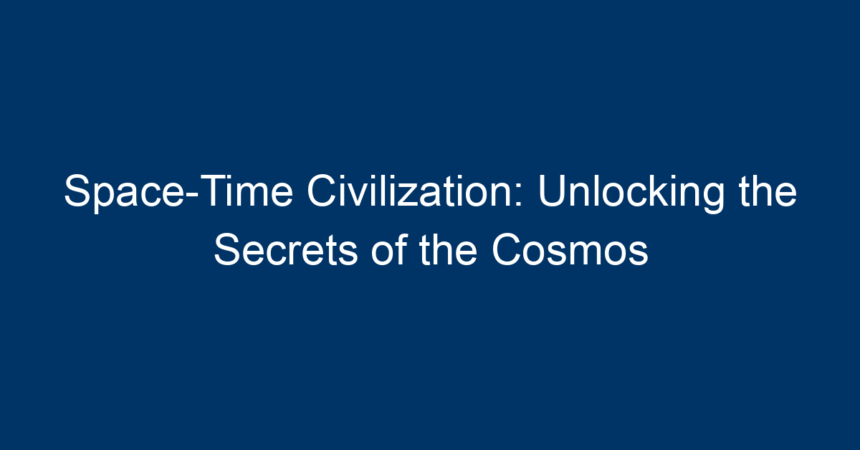The universe is an ever-expanding physical reality that invites curiosity and inspires wonder. As we look up at the stars, the questions multiply: What lies beyond our planet? Are there advanced beings out there? Could we harness the universe’s laws to become a space-time civilization? This article explores these riveting topics, delving deep into what it means to be a space-faring species and how understanding the cosmos can unlock unimaginable possibilities.
What is a Space-Time Civilization?
At its core, the concept of a space-time civilization refers to a society that not only ventures into space but also comprehends and manipulates the fabric of space-time itself. Originating from the theories of relativity proposed by Einstein, space-time is an intricate tapestry that merges the dimensions of space and time into a single continuum. As we embrace the idea of a space-time civilization, we envision a world where interstellar travel, advanced technology, and even time manipulation are not just dreams but realities.
The Foundations of Space-Time
Before we can establish a genuine space-time civilization, we must comprehend the fundamental principles of space-time. Einstein’s theory posits that massive objects warp space-time around them, influencing the flow of time and the paths of objects. This concept leads us to ponder how harnessing these dynamics may pave the way for groundbreaking advancements in technology and travel.
Advancements in Physics and Technology
Understanding the principles that govern the cosmos is vital for the development of a space-time civilization. Recent advancements in quantum physics, for example, have highlighted the paradoxes and phenomena that challenge traditional notions of reality. As we probe deeper into concepts like entanglement and superposition, we inch closer to technologies that could revolutionize our approach to space travel.
Quantum Computing: The Future of Processing Power
One of the most promising advancements in technology is quantum computing, which operates on principles that leverage the properties of quantum bits (qubits). Unlike classical bits, which can be either 0 or 1, qubits can exist in multiple states simultaneously, resulting in unparalleled processing power. This could lead to simulations that help us understand complex cosmic phenomena, ultimately aiding our quest to become a genuine space-time civilization.
Space Propulsion Technologies
Current propulsion systems rely on chemical reactions, limiting our ability to explore distant galaxies. However, emerging technologies, such as ion propulsion and nuclear thermal rockets, could enable more efficient and faster space travel. Moreover, the theoretical concept of warp drives suggests the possibility of bending or contracting space-time to achieve faster-than-light travel, a crucial factor in our quest to explore the universe.
Cosmic Exploration: The Next Frontier
The Era of Space Exploration
The 21st century marks a new chapter in our exploration of the cosmos. With private companies entering the space race, the dream of interstellar travel seems more feasible than ever. Initiatives like SpaceX and Blue Origin are pushing technological boundaries, proving that the sky is not the limit for ambitious explorers.
The Search for Extraterrestrial Life
One of the most compelling aspects of becoming a space-time civilization is our pursuit of extraterrestrial life. Missions like the Mars Rover and the study of exoplanets are increasingly geared toward answering the profound question: Are we alone in the universe? Understanding the possibilities of life beyond our planet is crucial for our evolution as a civilization.
The Drake Equation: Estimating Extraterrestrial Life
The Drake Equation serves as a probabilistic argument that aims to estimate the number of active, communicative extraterrestrial civilizations in the Milky Way galaxy. By analyzing factors such as the number of stars that have planets, the average number of planets that could support life, and the average lifetime of technological civilizations, we can frame our search for cosmic neighbors.
The Role of AI in Cosmic Exploration
Artificial Intelligence (AI) has rapidly evolved and is now an indispensable tool for space exploration. From autonomous navigational systems in spacecraft to algorithms that sift through massive datasets from telescopes, AI is driving our search for life beyond Earth and helping us interpret cosmic phenomena.
Challenges in Achieving a Space-Time Civilization
While the dream of a space-time civilization is exhilarating, we face numerous challenges along the way.
Ethical Considerations
Venturing into space raises pressing ethical questions. How should we treat other potentially intelligent species? What responsibilities do we bear towards ecosystems on other planets? As we explore the cosmos, it will be imperative to establish ethical frameworks to guide our interactions.
Resource Allocation and Sustainability
Creating a sustainable space-time civilization requires careful consideration of resources. Space travel and technology must not detract from our responsibilities on Earth. Innovations must prioritize sustainability to ensure that our advancements do not compromise the well-being of our home planet.
Actionable Steps Towards Becoming a Space-Time Civilization
Education and Awareness
The first step toward becoming a space-time civilization is fostering public interest and understanding of space science. Educational institutions should focus on STEM (Science, Technology, Engineering, and Mathematics) programs to cultivate the next generation of innovators.
Supporting Research Initiatives
Engage with and support organizations that focus on space research and exploration. Collaborating with governments, NGOs, and private sectors can amplify our efforts in investigating the cosmic unknown.
Embracing Innovative Thinking
Encouraging innovative, out-of-the-box thinking is crucial for the advancement of technology necessary for a space-time civilization.
Developing Global Partnerships
Global cooperation will be essential in addressing the challenges of space exploration. Countries must collaborate to share knowledge, skills, and resources in the ambitious exploration of the universe.
Conclusion: The Journey Ahead
As we unlock the secrets of the cosmos, the vision of a space-time civilization will become increasingly tangible. The integration of advanced technology, ethical frameworks, and global cooperation can steer humanity toward a brighter future. As we venture into the unknown, we must approach our cosmic journey with humility and responsibility, acknowledging the wonders of the universe while striving for progress. The stars await us; it’s our time to soar into the vastness of space, equipped with knowledge and united in purpose.
By taking actionable steps towards this elusive goal, we can ensure that the aspirations of a space-time civilization become a glorious part of human history, paving the way for future generations to explore the cosmos.




